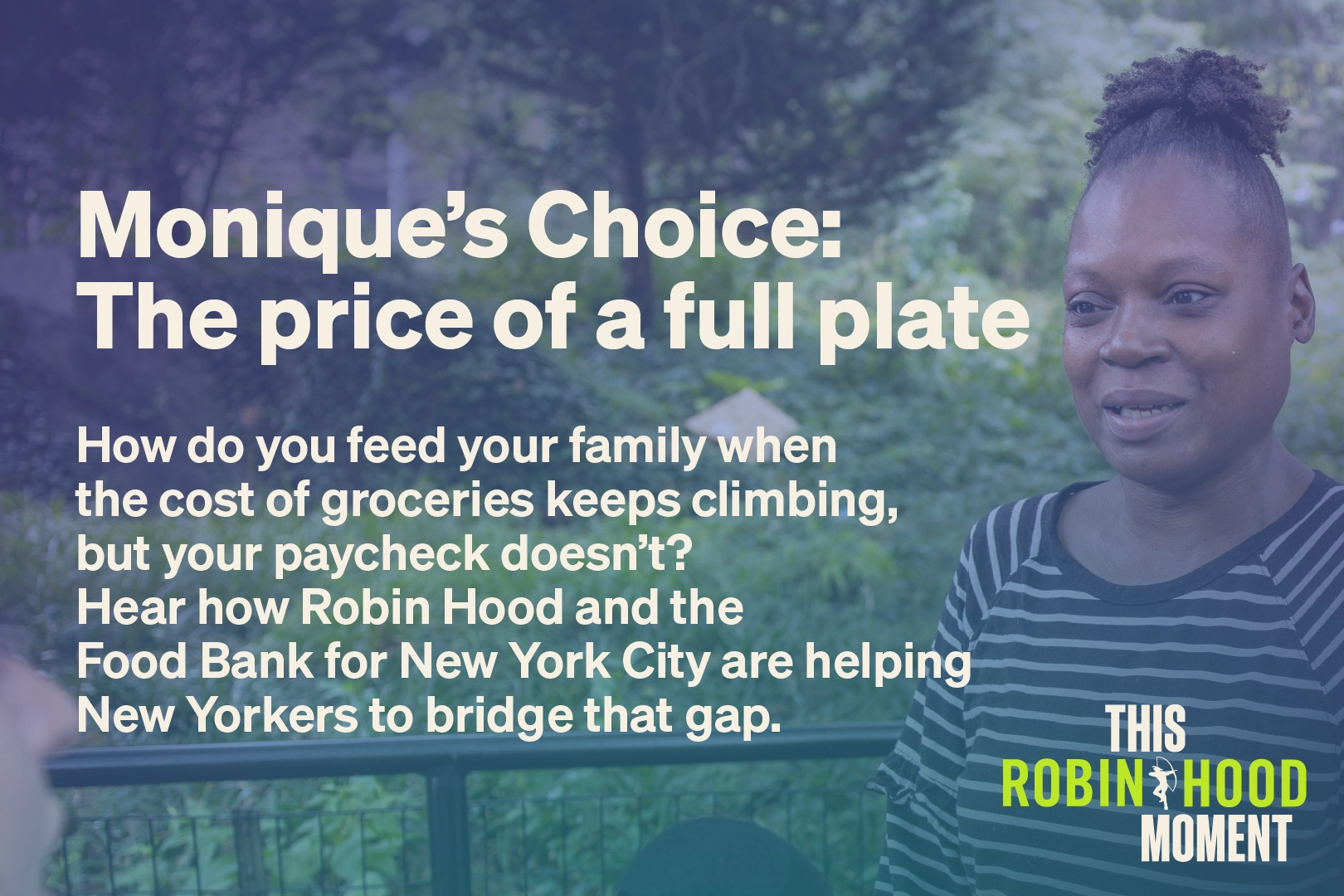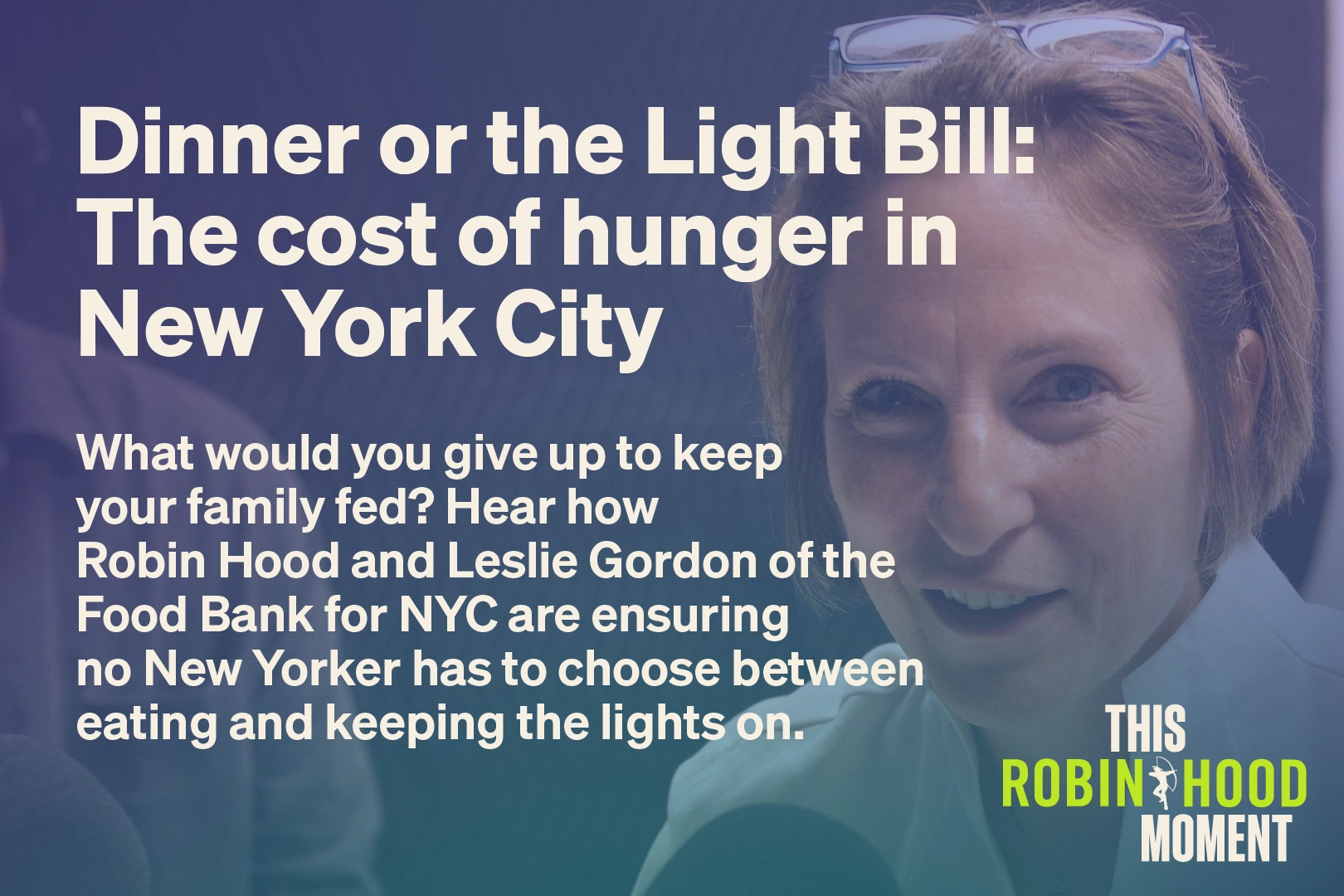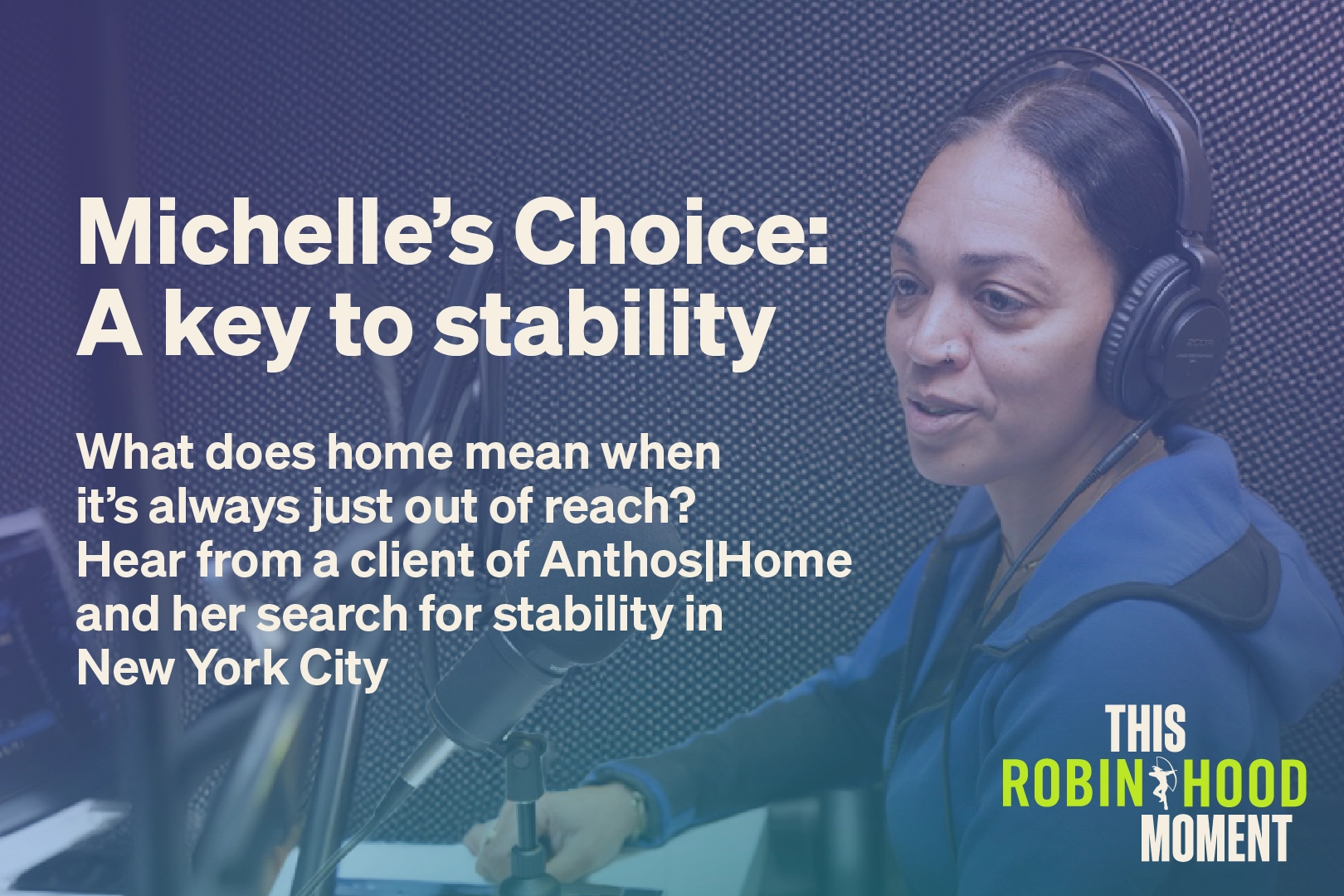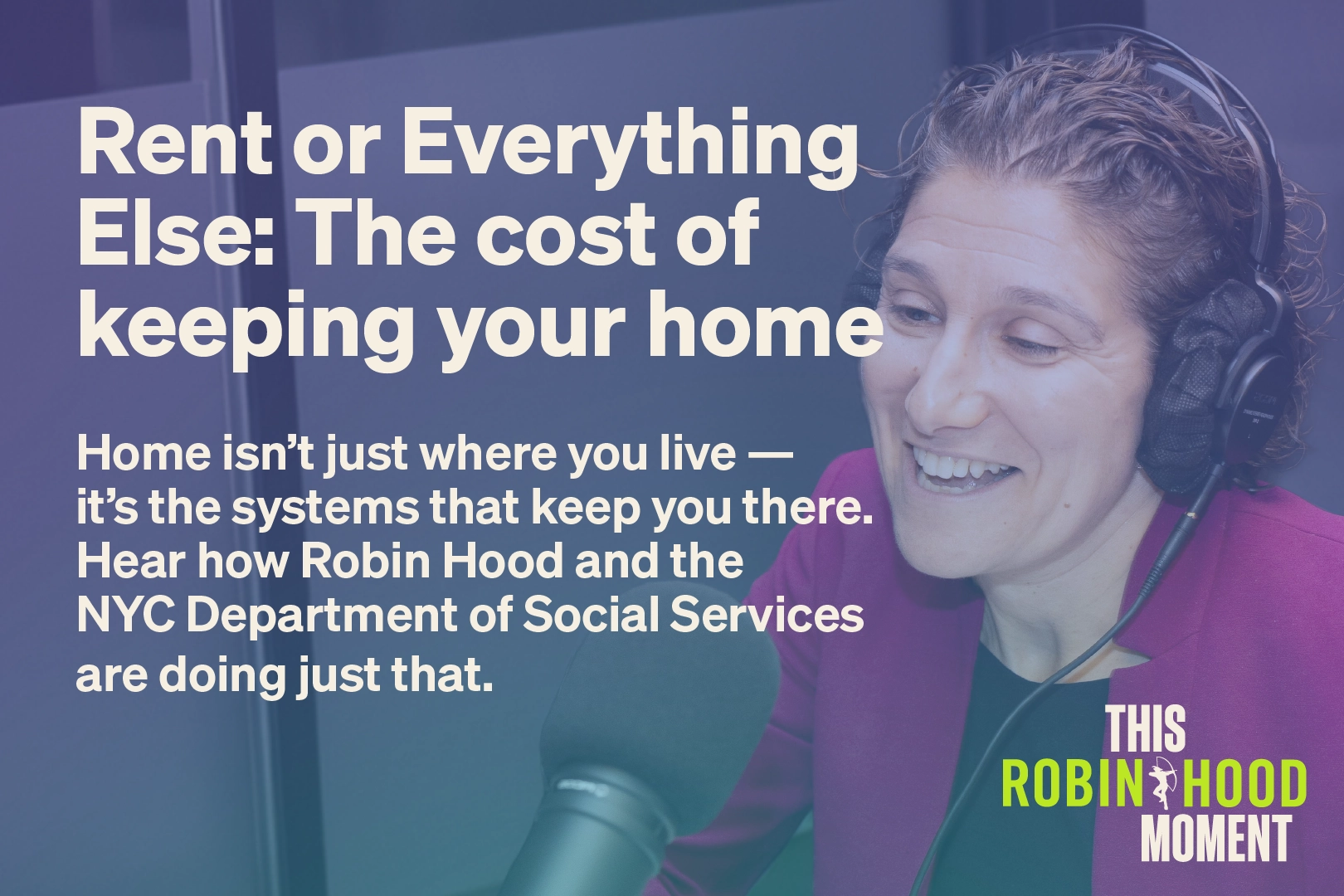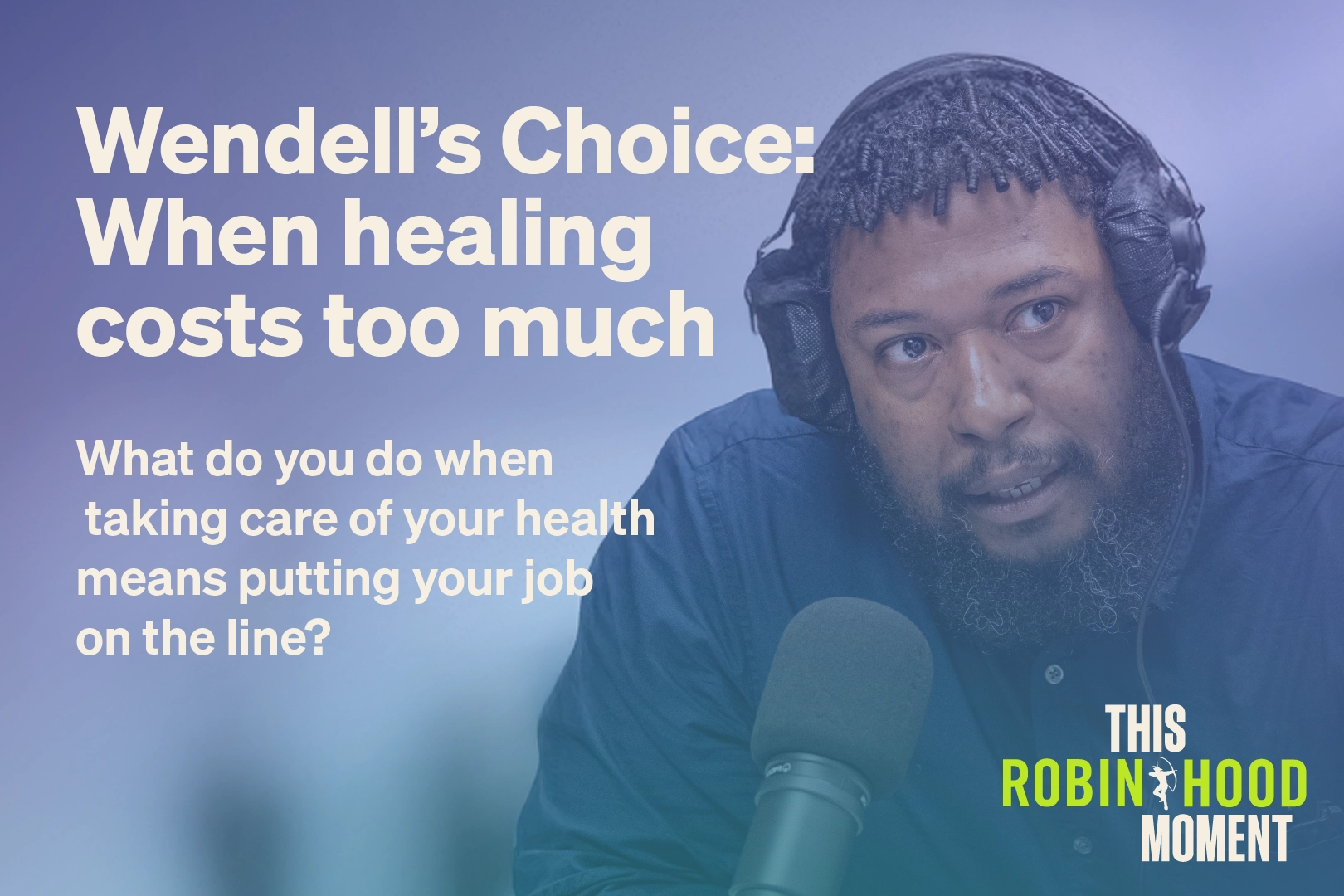Nov 04, 2025
Monique’s Choice: The price of a full plate (Bonus Episode) | This Robin Hood Moment
In Harlem, Monique has mastered the art of making a dollar — and a meal — stretch. A former teacher and mother of three, she navigates SNAP, food pantries, and rising grocery costs with precision and pride. But when every checkout line feels like a math test, even the most resourceful families are forced to make impossible choices. Monique’s Choice reveals the real cost of feeding a family in a city where abundance and hunger coexist.
Listen and Subscribe: Apple Podcasts | Spotify | iHeart | YouTube
Robin Hood is partnering with Propel, Inc. and GiveDirectly to launch an emergency fund for New York’s lowest-income SNAP recipients during the pause in federal payments. Learn more.
Interested in learning more about the Food Bank For New York City? Visit foodbanknyc.org.
Thoughts? Guest suggestions? Email us at info@robinhood.org.
“This Robin Hood Moment” is hosted by Kevin Thompson and Crystal Cooper. The show is produced and edited by Cory Winter, with graphic design by Mary Power. Additional motion graphics and footage are provided by Motion Array. Our theme music is from Epidemic Sound.
The views and opinions expressed by external podcast speakers and guests are solely their own and do not reflect the opinions of Robin Hood or its personnel, nor does Robin Hood advocate or endorse any individuals or entities featured on the episodes.
TRANSCRIPT
This transcript was prepared by a transcription service. This version may not be in its final form and may be updated.
Cory Winter: Every morning before her kids wake up, Monique runs through a checklist in her head.
Breakfast, lunch, dinner. What’s left in the fridge. What can wait until tomorrow.
She knows the grocery prices by heart now—eggs, milk, rice, oil—and how they’ve all crept higher, quietly, week by week.
She doesn’t complain. She plans.
She stretches meals. Reuses ingredients. Makes lists that bend but never break.
Because for her, feeding a family isn’t just about food. It’s about control—over the one part of life she can still manage when everything else feels uncertain.
Monique is a mother of three and a former teacher.
She’s smart, steady, resourceful.
She’s also one of 1.8 million New Yorkers who rely on SNAP—the Supplemental Nutrition Assistance Program—to keep food on the table.
And right now, that table feels a lot less stable.
Because when the cost of groceries rivals the cost of a utility bill, and rent is already late, even the most careful budget can buckle.
When the math stops working, the stress becomes something you can feel—in your chest, in your sleep, in the quiet between meals.
It’s easy to talk about affordability as if it’s abstract—a headline, a percentage, a policy debate.
But for Monique, affordability is personal.
It’s the difference between a full cart and a few essentials.
It’s the difference between dinner and the light bill.
And this month, because of the ongoing federal government shutdown, her SNAP benefits won’t arrive.
For families like hers, that’s not an inconvenience. It’s a cliff.
Missing just one month of benefits could push tens of thousands of New Yorkers into poverty.
Thousands of mothers just like Monique—who’ve done everything right, and still can’t afford enough to eat.
Monique isn’t failing.
She’s surviving an affordability crisis that’s failing her—and millions of others like her.
I’m Cory Winter, and you’re listening to This Robin Hood Moment.
And this… this is Monique’s story.
[MUSIC PLAYING]
Cory Winter: Before we talk about struggle, we need to talk about strength.
Because Monique’s story doesn’t begin in a pantry line or at a checkout counter.
It begins with purpose—and possibility.
She grew up in New York City, went to boarding school in Connecticut, and earned two degrees from Hunter College—one in English, one in Childhood Education.
She spent fourteen years teaching in the city’s public schools, shaping young minds, including second graders she once taught about “wants versus needs.”
Monique: I was born in Groton, Connecticut. My dad was in the military, but basically I grew up in New York my whole life—moved very young so I don’t even remember living there.
Grew up in the South Bronx. Attended public schools up until middle school. Then, I had an opportunity to go away to boarding school in Connecticut. So I went to the Canterbury School in New Milford for High School, and then decided that I wanted to come back to the city to go to college. So, I came back home and attended Hunter, so I have a Bachelor’s in English from Hunter and a Master’s degree in Childhood Education from Hunter.
Cory Winter: When schools shut down, life shrank to a two-bedroom apartment in Harlem.
Three kids. Three meals a day. Seven days a week.
What used to be an afterthought—groceries—became a full-time job.
Monique: So ****I worked for 14 years in the Department of Ed[ucation], stopped in 2019 because I did want to move out of New York, I considered it. But then the pandemic happened, and then we all were home, and then that’s pretty much when I wasn’t working, and I was home because all the kids were home, and then they were going back to school and then they were not in school. So I was the one that was more flexible at that time because their dad is a nurse, so he was definitely working like crazy during that time. Now I’m trying to get back to work full time, but not as of yet. So if anybody wants to employ me, I’m available! Hahahaha!
Cory Winter: That’s how it begins for so many New Yorkers—not with a crisis, but a slow accumulation of small expenses that become impossible to ignore.
Eggs. Milk. Electricity. Rent. Everything, all at once, creeping upward while paychecks stay still.
And for Monique, who’s spent her career teaching kids how to plan, prioritize, and persevere—the hardest lesson became her own.
When prices rise faster than income, even the most prepared, educated, resourceful families find themselves doing math they never imagined doing.
The difference between groceries and the light bill isn’t a question of effort.
It’s a question of affordability—and who pays the price when systems fail to keep up.
That philosophy has guided her family through every tough month since the pandemic.
But as prices keep rising—and public benefits hang in uncertainty—even “making it work” starts to feel fragile.
Monique never imagined she’d stand in a food pantry line.
Not because she thought she was above it—but because she’d always managed to make things work.
For years, she budgeted like a math teacher, planned like a parent, and made every dollar count.
But when the world shut down, so did predictability.
Monique: But honestly it was during the pandemic when like everyone was home and I found myself cooking like breakfast, lunch, dinner and was pretty much going to the supermarket like every other day, you know, and I was like, wow, this is really costing a lot.
Cory Winter: Her first pantry visit was on 129th Street, between Seventh and Eighth.
The line wrapped around the block—parents, seniors, delivery workers still in their uniforms, kids tugging on sleeves.
People who looked like neighbors, not strangers.
And that’s exactly what they were.
Monique: So then I started to go to the one that she went to, which was like on 129th and, between Seventh and Eighth Avenues. And then pretty much like throughout the pandemic, there was some that were close, like to where I live. So then I started to attend, and then the more I attended, the more people, I conversed with and they would tell me about other ones. And that’s pretty much how that started. It was pretty much during the pandemic when I started going.
Cory Winter: For Monique, that line became more than a means to an end.
It was proof that she wasn’t alone—that needing help didn’t mean failure; it meant being human in a city where the basics had become luxuries.
Monique: And I was really surprised because, you know, thinking about my children’s grandmother, she would go, like, with her friends. And I would see that, like, they would all go like together and it would be talking and stuff like that. I never really thought about it then, but then when I started going by myself, initially I didn’t say, you know, too much to too many people, but then I would start seeing the same people.
So then it became, you know, we were just, you know, talking to each other, you know, on a line last week to like, “Hey! Good morning. How you doing, Miss Matilda?” is one who I befriended or “How you doin’ Miss Rose,” I’d say, just standing and talking. It’s like people asking how your kid’s doing. So it’s like that kind of like sense of community that I find really amazing, you know?
So now when I go out, I’m like, I’m going to pantry to see my friends, and my kids always laugh like, mom you crazy? I’m not, I’m going to see my friends. I’ll see you later.
Cory Winter: That sense of dignity—of connection — is what keeps so many New Yorkers like Monique showing up.
Because when prices keep climbing, and the government debates whether people like her deserve help, it’s the kindness of strangers that fills the gaps policies leave behind.
Today, with 1.8 million people in New York City relying on SNAP.
That number can feel abstract — until you meet someone like Monique.
That’s the quiet fear beneath every plan she makes — that the math could stop working overnight.
Because no amount of budgeting or resilience can fill a gap that wide.
And yet, every morning, Monique gets up, runs through her checklist, and finds a way.
[MUSIC PLAYING]
Cory Winter: By now, Monique has the rhythm down — a routine built from resilience.
Groceries mid-month when the SNAP benefits arrive, pantry visits toward the end, cash in between to cover the gaps.
It’s a routine that only works when everything goes exactly right — and almost nothing ever does.
For Monique, adjusting is a way of life.
She calls it stretching — stretching groceries, stretching pay cycles, stretching her own energy until the month turns over again.
Monique: I look at like what we have, like if there’s like still chicken or if there’s still whatever, then it’s just getting what, what I need in order to use that to make a meal. It’s not like when you go to the pantry you know what they’re going to have, you know, it’s not like you get a menu, you know?
So I remember going to, I think in two days I went to like, three different ones. And then like, one had ground beef and then like another one had, like, tomato sauce and rice. And I think the one I had meat also gave out canned beans. So it was like between like those three, it was like meat, beans, tomato sauce. And it was rice. So there we go. Chili. So yeah, it was was just simple like that. It wasn’t anything romantic. It was just that. tLike, it is taking what you have and making something out of it, you know.
Cory Winter: Sometimes, what’s left turns into something beautiful.
That pot of chili—it’s more than dinner.
It’s proof of what resourcefulness looks like in real life: taking what’s available and turning it into nourishment.
But Monique’s resilience doesn’t erase the exhaustion that comes with it.
Because the energy it takes to survive poverty is, itself, a kind of unpaid labor—a second full-time job.
Monique: It’s so interesting because the other day I was having this conversation with my 14 year old and my 21 year old chimed in, because, you know, is back to school shopping. And I had this whole conversation. I’m like, you remember second grade, right? Because I taught second grade like three years out of my 14 year tenure. And I’m like, you know, we do teach wants and needs.
I said my job as a parent is to provide the needs first. And I say even within the needs there are priorities. You know, shelter is is a priority, right? Paying a Con Edison bill to keep the light and gas line cable is kind of optional. But now not really because you need Wi-Fi. Right. Pretty much like a necessity.
Now as well. Right. For me then it’s like food, right? So I said, well, those are the top four that I really focus on. Then of course we need clothing, but you know, I’m not buying clothes like every month, you know, you buy things as you once again need it, right? So I think that same way like is managing a household is it’s just like, okay, we have to do, prioritize what’s needed at the pay it is, and this week or next week or whatever it is. And you just have to like kind of juggle it, you know.
Cory Winter: That’s not just a budget strategy; it’s a philosophy— a survival code written out of necessity and passed down through love.
And yet, when the government delays a benefit check, or inflation pushes prices higher, that philosophy is tested again and again.
Because even the strongest foundation can’t withstand a system that keeps shifting beneath it.
Every episode this season, we’ve asked a simple but impossible question:
What’s the cost of choice when poverty limits every option?
For Monique, choice has become a balancing act between essentials.
She pays part of the rent now, the rest in two weeks. Con Edison this check, Wi-Fi the next.
It’s not mismanagement—it’s survival in real time.
Monique: Like if it comes to like, bills are like a necessity. Maybe instead of like, you know, doing everything I once was like breaking it up. So the rent may be a little late. I mean, I got to take some like, you know, because I get money like, every two weeks from their dad, you know, thank the Lord that he does help financially.
So maybe like this check I’m gonna take this amount and put this was this, that, that. And then the next two weeks, then here’s the rest of that. Here’s the rest of that. Here’s the rest of that. So you kind of have to break things up like that, because most people don’t have enough to do everything at one time.
Cory Winter: It’s not just groceries or bills — it’s also her peace of mind.
Every delayed deposit, every price hike, every new headline about cuts to public benefits, threatens the delicate balance she’s built.
Monique: I mean, I think about it. I mean, I’m aware of it; the cuts to SNAP and to Medicaid. So, you know, it’s unfortunate, you know, to those who are going to be impacted disproportionately, you know, but I think eventually, like, people will be resilient and they’ll, you know, find a way. That’s what I hope for this month.
Cory Winter: This month, that quiet anxiety became real.
The federal shutdown meant no SNAP benefits in November.
One missed month that could undo years of effort.
[MUSIC PLAYING]
Cory Winter: According to Columbia University’s Center on Poverty and Social Policy, that single lapse could push 35,000 New Yorkers into poverty — 23,000 of them right here in the city.
Each of them a Monique. Each of them a parent, a provider, a planner who did everything right.
Monique: I think what most families will have to do, if they’re not doing it now, would probably be like making larger meals, like making like a big pot of spaghetti. And we’re eating that for two days, you know, eat in like, I mean, excuse me, making, like, a big pot of chili. We’re going to eat that for two days. You know, whatever it is, I think just making larger amounts and separating over days.
So, I mean, that’s the only thing I can, like, practically think of. Other than that, I don’t know how else you would do it other than making certain dishes that you can make a lot of.
Cory Winter: Monique’s resilience shouldn’t be the city’s safety net.
And yet, for millions of New Yorkers, that’s exactly what it’s become.
Because when policies fail, people like Monique hold the line — one grocery bag, one meal, one day at a time.
[MUSIC PLAYING]
Cory Winter: When I ask Monique what would give her family some breathing room, her answer isn’t complicated.
Monique: What I would think, well, what I plan that will give us more breathing room is number one for me to go back to work full-time so that, I won’t be as dependent on, SNAP or food banks. I mean, the more money I’m able to bring in, the less I won’t have to spend on, these services, and I think also with my children, you know, hopefully, you know, with the next two years, my daughter will have graduated from college and then hopefully she’ll be working full-time. So I mean, I the only thing I can think of that would improve my situation is to get employed and for my daughter to get, you know, to make more money, as she finished up school.
Cory Winter: It’s not a dream of luxury — it’s a dream of stability.
The kind that used to feel attainable for working families in New York City.
But it seems stability has become a privilege here.
For many, even full-time work doesn’t guarantee enough.
And for those who can’t work — seniors, caregivers, people with disabilities — programs like SNAP are the difference between a meal and an empty plate.
Food isn’t optional. And yet, every few years, we find ourselves debating whether struggling families deserve enough to eat.
Monique: Food matters because it’s a basic human right. We all have, you know, we all have the right for, you know, to have food, clothing, shelter, you know, those are basic necessities. If you’re a humane individual, you shouldn’t make assumptions about why people are, utilizing SNAP and food banks. But, I mean, I learned personally, you know, being on SNAP and going to food pantries, it humbled me.
I didn’t think I was better anyone else because I’m standing on a line like everyone else. And I feel like those who don’t have to make those choices. I feel like you shouldn’t look down on those who may have to. So I think, you know, I think the more people that keep things in perspective, you know, about what it cost to live and the struggles that people do, experience.
And, I think it just that, instead of having judgment, have compassion.
Cory Winter: That’s what Monique teaches her kids — compassion over judgment, persistence over pride.
It’s the same lesson she once taught in her classroom.
Only now, the stakes are higher.
Because the real test isn’t about how she manages.
It’s about whether the city, the state, and the country can manage to keep families like hers afloat.
[MUSIC PLAYING]
Cory Winter: Monique’s story is one of millions across New York City — stories of parents who plan, hustle, and stretch just to stay fed.
Her story is proof that poverty isn’t a lack of effort. It’s the cost of an economy that makes survival feel like success.
At Robin Hood, we believe New Yorkers like Monique shouldn’t have to choose between groceries and the light bill — between dignity and dinner.
To learn how we’re fighting poverty across the five boroughs of New York City, and how you can help, visit robinhood.org.
A special thank you to the Food Bank for New York City — one of Robin Hood’s community partners — for their tireless work ensuring that families like Monique’s have access to the food and support they need.
And above all, thank you to Monique Lewis for sharing her story, her strength, and her voice with all of us.
I’m Cory Winter. Thanks for listening, and for being part of this moment.
[MUSIC PLAYING]
